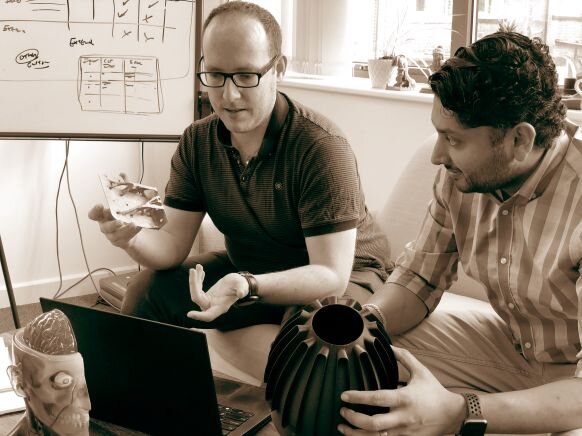3D print consulting [Source: Blueprint]![3D print consulting [Source: Blueprint]](https://fabbaloo.com/wp-content/uploads/2020/05/image-asset_img_5eb067c3da55e.jpg)
I had a bit of an argument with Blueprint the other week, and the result were interesting.
Blueprint Consulting
If you haven’t heard of Blueprint, they are a Minnesota-based consulting company that specializes in 3D printing engagements. They describe themselves as:
“The world’s leading 3D printing consultants with over 15 years of unrivaled experience. We provide the insight, experience and tools to guide you through the world of 3D printing.”
What exactly do they do? They offer consulting in three areas: 3D print strategy, operations and application development. In other words, if you are a manufacturer and puzzled about how to start, confused about which path to take, unclear on a specific application design, you might consider calling on Blueprint to guide you through to a workable solution.
This is pretty standard consulting fare, and is normally performed by experts who have years of experience in those specific areas. That seems to be the case with Blueprint.
But there’s just one problem.
Blueprint and Stratasys
Blueprint was acquired by Stratasys. Today we see a rather prominent Stratasys banner at the bottom of each of their pages.
Now I know what you’re thinking: “if they are owned by Stratasys, I can guess which solution they always recommend.”
I was thinking that too. This is a very common business practice, where a company generates sales leads through a consulting organization. In many industries it is the primary method of client acquisition, so it’s likely the same here.
I happened to mention this during an unrelated chat with Blueprint representatives the other week, and they challenged my assumptions. They said they are in fact quite independent and don’t recommend Stratasys often. They said most of the time they recommend alternative suppliers, and even guide clients toward non-3D print solutions.
Their slogan is: “Stratasys Minds. Independently Minded.”
Sure, this is what every consulting organization would say at the point in the discussion. I remained skeptical.
“No, no,” they said, “we really are independent!”
“Okay”, I replied, “Prove It!”
“We will”, came the reply.
Blueprint Client Analysis
I remained skeptical, but then they showed up with some rather intriguing information.
Apparently they took my challenge quite seriously and went through years of data from their operations in an attempt to prove my suspicions inaccurate. They provided this list of vendors they have recommended to consulting clients:
-
Material Extrusion: Stratasys, Ultimaker, Markforged, MakerBot
-
Powder Bed Fusion (Polymer): EOS, 3D Systems, HP
-
Powder Bed Fusion (Metal): EOS, GE Additive (Arcam + Concept Laser)
-
Vat Photopolymerization: 3D Systems, FormLabs, Carbon
-
Material Jetting: Stratasys
-
Binder Jetting (Ceramic/Polymer): VoxelJet
-
Binder Jetting (Metal): ExOne, Desktop Metal, Hoganas
-
Direct Energy Deposition: Optomec, BeAM, Trumpf
And then provided this chart of the proportions of each technology recommended for the period of 2013-2019, which is mostly under the Stratasys regime. Note that this represents unit counts for recommendations, and does not account for the size of each recommendation.
![Chart of Blueprint 3D Print consulting vendor recommendations 2013-2019 [Source: Blueprint]](https://fabbaloo.com/wp-content/uploads/2020/05/image-asset_img_5eb067c41f132.jpg)
Chart of Blueprint 3D Print consulting vendor recommendations 2013-2019 [Source: Blueprint]
It may be important to point out that Stratasys, although one of the largest players in the space, only provides 3D print solutions in two basic technologies: Material Jetting (in the Stratasys and Solidscape brands) and Material Extrusion (Stratasys and MakerBot brands). I understand that Stratasys does hold a minor share in Desktop Metal, but they do not control that company.
In the chart, the largest segment is Material Extrusion, but it’s only 28% of the total. And that will be broken up a bit further into Stratasys and alternative suppliers. The second largest category is Powder Bed Fusion at 23%, which is not supplied by Stratasys.
By my calculation, it seems they are recommending Stratasys solutions less than 32% of the time, and providing alternative recommendations at least 68% of the time.
So it seems their claim of independence may actually be true, at least to the degree indicated by these statistics. I am becoming convinced my initial assumptions may have been incorrect.
This analysis leads to another question: would other 3D print consulting organizations be willing to do a similar analysis? I wonder what we might find.
Via Blueprint

